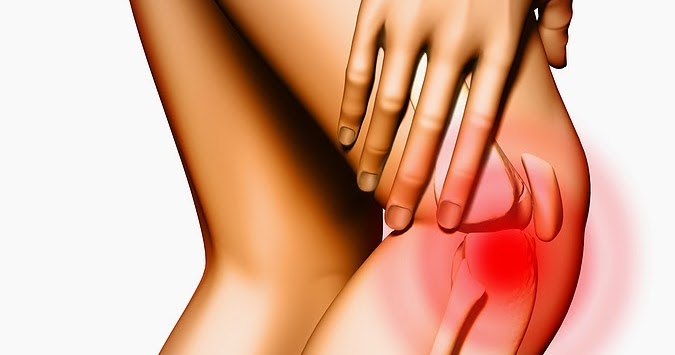Candidate for Total Knee Replacement?
Who decides whether you will have a total knee replacement operation? Curiously enough, you are the boss, you decide!
- Your surgery depends principally on your willingness to comply with the long, demanding post-operative physical therapy and rehabilitation program that follow the surgery.
- All other considerations (your age, disease character, etc.) are secondary.
- The decision to have the operation of a damaged knee joint is a highly personal matter, and only you can make that decision, together with your surgeon.
Pain – The Cardinal Sign
The surest guide to determine the need for total knee replacement is the severity of the pain in your knee joint. Although you suffer severe pain, you may still be unable to describe the pain, not even pinpoint its location.
Most patients with knee joint disease feel pain in the knee joint.
You must, however, be aware that not all pain that you feel in your knee joint area is provoked by a knee joint disease.
The pain in this area may be caused by:
- encroachment of some of the nerves around the hip or knee joint, or even from encroachment of spinal nerves
- inflammation in tendons and bursa (sacs with fluid lying between tendons and bone) around the knee joint
- pain in the knee joint area, especially on inside of the knee joint may be a projection of pain generated by a hip joint disease
The character of the pain depends on the type of the knee joint disease. It is related to the patient activity in osteoarthritis, it varies with the disease activity in the rheumatoid arthritis, and it is constant in the avascular necrosis of the femoral condyle or in a tumor.
TKR – an operation to relieve your pain
Total knee replacement operation is most successful in just relieving pain. Therefore, the more pain you have the greater are the chances that the operation will be a success.

Is your pain like this?
- You suffer severe pain that impairs not only your work and recreation, but also ordinary activities of daily living
- The pain does not disappear after a longer period of rest
- You notice disturbing pain also when sitting or standing still
- Pain in your knee is so severe that it impairs you sleep
- The pain killing medicines do not work or work only for a short time
- Together with pain you also notice increasing painful stiffness in the knee joint, that further impairs your ordinary activities of daily living
- Several months treatment (anti-inflammatory medicines, physiotherapy, and like) did not change the pain
If your pain is like this and the X-ray pictures demonstrate impairment of your knee joint, then you are a candidate for the total knee replacement and you should seriously consider the surgery.
Can you tolerate your pain?
Remember that the total knee replacement is no good to treat minor pain and occasional discomfort in your knee joint. Moreover, total knee operation is a major surgery and as such always associated with certain risks. Therefore, ask yourself these questions:
- Do you experience pain in the knee only after long periods of strenuous activity, for example after playing soccer or after cross-country jogging?
- Does this pain disappear after a shorter period of rest (30 minutes or so)?
- Is the pain bothersome, but not severe enough to require pain killers?
- Is the pain bothersome but you can always relieve it by pain killers or NSAIDs?
- Do you notice the pain only during and shortly after physical activity, but never during rest or sleep?
- Do the X-ray pictures of your knee show only minor impairment?
If you answered yes to these six questions, the chances are that you don’t need surgery – at least not for the time being.
In the meantime, you should modify your activities to ease the stress that you put on the painful knee joint. Shorten the walk, or try bicycling, stationary or mobile. The best all-round exercise is swimming. A physiotherapist can prescribe an exercise program for you.
Why should you wait?

Patients operated on for minor knee problems are more often dissatisfied with the results of their total knee operation
Total knee replacement is major surgery and entails certain risks. Thus, it should not be undertaken unless there are compelling reasons for it.
Will the operation be more difficult if you wait?
It depends.
Usually the operation will not be more difficult if you are suffering from slowly progressing idiopathic osteoarthritis of the knee joint (wearing out disease of the knee joint).
On one condition, however: you must exploit the “waiting time” to improve your general physical condition and improve the strength of the muscles around both of your knees.
Just as well, if you observe increasing contracture in your knee, increasing instability, or wasting of the musculature around the knee, then you should not wait.
Remember also that as you wait too long the function in your knee and your general health are likely to decline. The operation results in patients waiting too long are worse. (Fortin 1999)
There are certain diseases that may destroy the knee joint too much if you will be waiting too long (rheumatoid arthritis, e.g.).
So ask always your surgeon whether the operation will be more difficult if you postpone it.
How important are X-ray pictures?
How much importance should you put on the X-ray pictures for your decision to be operated on?
This depends on the character of your knee joint disease. Remember that a X-ray picture is a meager shadow of reality. The X-ray picture cannot tell how much pain and other discomfort you really have. In some very painful knee joint diseases (avascular necrosis, e.g.), the conventional X-ray picture cannot even discover any disease in the knee joint initially.
In general, however, the patients with more advanced X-ray changes have also more pain in their knee joints.
Should you wait for development of better artificial knee joints?
It is true that new models of total knee joints are generally better than the old ones but the rate of progress in this area is uncertain.
If your pain and disability are severe, than there is no point in waiting for progress of the technique.
Should you wait for bio-engineered knees?
The bio-engineering science makes certainly a very good progress in preparing living cartilage tissues – at least as heralded in the media. Should you wait until these bio-engineered cartilage cells be available to be implanted into your worn out knee joint?
You should know two facts.
First, as yet the bio-engineered cartilage cells failed to heal badly worn joint cartilage in osteoartitic knees. This method is as yet most successful only for small cartilage defects in femur condyles, not for typical osteoarthritis changes. (www.carticel.com).
Second, only about 20 % of all results in this field have been published. Much of the development in this field is financed by private for-profit companies and they decide which results should be published. Bad results usually do not improve the price of stock shares.
Can osteoarthritis of your knee improve without operation?
In contrast to the osteoarthritis of the hip joints, osteoarthritis of the knee is less forgiving and deteriorates more often with time.
The pain and stiffness in your knee may improve without treatment, but the progress of osteoarthritis is not predictable, it varies greatly from person to person. The pain may become unbearable within six months for one person, yet drag on at a tolerable level for several years in another person who has the same degree of arthritis on X-ray pictures.
What about stiffness, deformity, or instability of your knee.
All these symptoms may be cured by the total knee operation, although not always completely. If you suffer from these symptoms, then you have more reasons to contemplate a total knee operation.
It is also important to know that:
- very severe instability of the knee joint and
- very severe weakness of the muscles (mainly the quadriceps muscle) around the knee joint
- usually exclude good function of the total knee joint and many surgeons would be against total knee replacement of such knee joints
Are your expectations realistic?
The total knee joint will relieve your pain and restore a great deal of function in your destructed knee, but it will never be as good as a natural healthy knee joint.
So you are not a good candidate for a total knee replacement if you have unrealistic goals such as:
- unlimited walking possibility
- complete disappearance of all pain
- normal range of motion in the knee joint
- ability to return to sports such as soccer on competitive level
Who is an ideal patient for a Total knee replacement
According to enquiry among surgeons, the patient with best chances to succeed with Total knee replacement should:
- have severe pain in the knee joint
- have the diagnosis of osteoarthritis
- the knee joint should be stable or only slightly unstable
- the musculature around the knee should be reasonably strong
- the skeleton should be reasonably strong
- the patient should weight less than 100 kg
- the patient should not have other serious diseases
- the patient should be > 60 years old
- the patient should be well motivated and informed about the possibilities and risks of the surgery
Knee pain after fused hip joint
Fusion of the hip joint has been a wonderfull operation, used often in the past to reliefe pain in the destructed hip joint. Unfortunately, these patients developed often severe osteorthosis and pain in the spine and in the knee.
Patients with severe osteoarthrosis and pain in the knee after fused hip joint often contemplate a total knee operation to relieve knee pain. The results of such operation are not good, the pain often continues and the total knee fails.
To relieve the severe knee pain, the surgeon should first take down the fused hip joint and replace it with a total hip. This is a big operation with risk for postoperative complications.
Then the surgeon may perform a total knee replacement. The results of this operation are usually good. (Rittermeister 2000)
Who cannot have a total knee surgery
- Patients with uncontrolled diabetes, lung, kidney, or other systemic disease
- Patients with ongoing or recent infection in the knee joint area
- Patients with severe paralysis of muscles around the knee
- Patients with severe circulation problems (painful claudicatio) in the extremity.
- Patients with severe skin damage in the front of the knee joint
- Patients with open wounds in the lower leg.
Other reasons why surgeons may abstain from operation
Many surgeons will hesitate to carry out total knee replacement in
- badly motivated patients
- patients seeking financial or other gain from total knee surgery
- overweight patients ( > 100 kg)
- persons with alcohol abuse
- people with dementia (Mancuso 1996)
Other important factors
There are other very important factors that decide whether you should have total knee replacement and whether you will be satisfied with the operation.
These factors include your age – you are never too old but you may be too young (in the eyes of your surgeon) for a TKR surgery
For more information about this factor, please visit the sections below:
Are you too young to have a TKR?
References:
- Fortin P et al.: Arthritis Rheum 1999;42: 1722-8
- Lane et al.: Clin Orthop 1997;345:106-12
- Mancuso et al : J Arthroplasty, 1997; 11: 34 – 46.
- Parvizi et al.: J Bone Joint Surg-Am, 2001; 83-A: 1157 -60)
- Ritter et al.: Clin Orthop 1997;345:99-105)
- Rittermeister M et al.: Clin Orthop 2010, 371: 136-45
- Sulek et al Anesthesiology.: 1999;3:672-6)